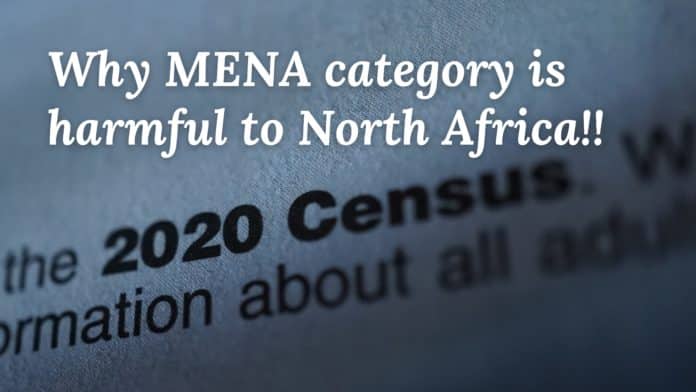The Middle East and North Africa (MENA) category has long been used to describe a vast region that includes “the Arab world” and the countries of North Africa. While seemingly convenient, this broad categorization oversimplifies the diversity within the region, perpetuates stereotypes, colonial legacies and erases the indigenous North African identities. By separating the Middle East and North Africa into distinct categories and promoting inclusivity, we can move away from generalizations, biases, misinformation, and the enduring legacy of colonization.
The MENA Category: Oversimplifying Complexity
The MENA category lumps together countries with vastly different histories, cultures, and languages, which diminishes the rich diversity within the region. By grouping North Africa with the Middle East, indigenous North Africans are often overlooked, leading to their erasure. North African countries, such as Morocco, Tunisia, Algeria, Libya, and Egypt, have distinct cultural and historical backgrounds that should be recognized and respected and have a majority of Amazigh populations.
Erasure of Indigenous North Africans
One of the significant consequences of the MENA category is the erasure of indigenous North Africans. These populations, which include the Amazigh people, have inhabited North Africa for thousands of years and have distinct identities, languages, and cultures. However, by grouping North Africa with the Middle East, the focus tends to shift towards Arab cultures and language, overshadowing the rich heritage of the indigenous peoples. This erasure perpetuates a cycle of cultural marginalization and fosters a limited understanding of the region.
Additionally, it chops the African continent further perpetuating the legacies of imperialism and colonization. The Amazigh are in Mali, Niger, Sudan and a MENA category divides Tamazgha or North Africa from the African continent and cultures.
Misinformation and Legacy of Colonization
The MENA category also perpetuates misinformation and reinforces a legacy of colonization. Historically, the categorization of the region as “Middle East” and “North Africa” has been rooted in Western colonial perspectives, focusing on the strategic interests of colonial powers. This legacy continues to impact perceptions and misrepresentations of the region today.
The relationship between the Arab and Amazigh people is indeed complex
It is important to note that the relationship between Arab and the Amazigh people is very complex. Arab culture has been promoted and maintained by the political and social structures that have historically been in place. Arab rulers and elites often held positions of power and influence, and Arab culture was often associated with status and privilege. This historical context has contributed to the prominence of Arab culture in various spheres though a minority as the Amazigh are a majority in North Africa. Furthermore, the Middle East itself is diverse ethnically.
In past years, there has been a growing resurgence of revitalization of Amazigh culture and identity led by the Amazigh movement.
Moving forward with the categorization of MENA promotes Arab culture at the expense of Amazigh cultural revitalization efforts, as historical and political power dynamics have often marginalized the native Amazigh culture in favor of the Arabization agenda. This is reflects exclusivity and will ignite ongoing conflicts.
Moving Towards Inclusion: The Need of two separate categories
To address the harmful consequences of the MENA category, an alternative approach is to adopt the solution of two different categories. By separating the Middle East and North Africa into two distinct categories, we can foster inclusivity and provide a more accurate representation of each region. This recognizes the unique identities of both the Arab people and the Amazigh people of North Africans.
Embracing the two categories allows for a more comprehensive understanding of the cultural, linguistic, and historical diversity within each region. It also acknowledges the distinct experiences and struggles of indigenous North Africans and does not chop Africa.
In conclusion, the MENA category’s harmful effects on indigenous North Africans cannot be overlooked. By separating the category and adopting a one category for each region, we can foster a more inclusive and accurate representation of the region. This approach avoids erasure, acknowledges diverse identities, and challenges the legacy of colonization. It is crucial to move away from broad categorizations and work towards an understanding that respects and celebrates the unique cultures and histories of all the peoples of each region.


very good article
Thank you for reading!!
Yes North Africa’s culture is different but not all Middle East is Arab its just the Arabian Peninsula also Egypt and Sudan are in the Middle East but also in North Africa.
Throughout history, the North African countries were never united under the so-called “Tamzgha region”….the term is new and it was coined in late seventies to combat Arabization in the region. You can not divide North Africa and the middle east. It’s impossible. Both regions share lots of things in common: religion, language, history to mention a few. Personally, I consider myself an Arab even if I was born and I grew in Morocco. Majority of Moroccans are very proud to be Arabs and they are ready to preserve the heritage of their ancestors.
on the contrary, the term MENA reflects realities more than the term “Arab world” which is too reductive. The term MENA highlights a distinction between North Africans (Amazigh) and Middle Easterners (who are not all Arabs), but while not denying the deep cultural and social ties that unite these two regions: languages Afro-Asian, Islam for more than a millennium, different but similar traditions and customs. To conclude, the term MENA is correct, because it highlights ethnic and regional diversity while taking into account the deep ties that unite these two regions.